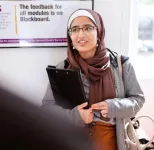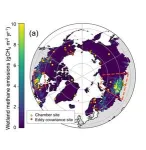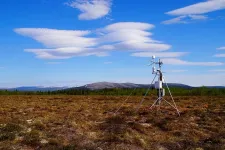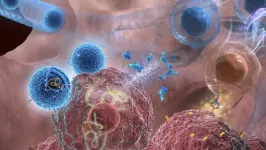(Press-News.org)
• Eleven scholarships worth £10k each for MSc Applied AI
• They are funded by the Office for Students (OfS)
• Aimed at graduates without a science, tech, engineering or maths degree.
Aston University is offering more opportunities to graduates who want a career in artificial intelligence (AI) but don’t have a science, technology, engineering or maths degree.
The scholarships are offered due to increased funding from the Office for Students (OfS). Each award is worth £10,000 and will be awarded to students enrolling on the course in September. The government scheme aims to ease the shortage of AI and data specialists in the UK and increase diversity in the sector.
Women, black students, disabled students and students from lower socioeconomic backgrounds are currently underrepresented in the AI and data science professions.
Last year the University offered nine scholarships to graduates who want to work within the expanding AI sector but don’t have a relevant qualification.
This year the University is offering 11 scholarships for the MSc Applied AI for September 2024 entry.
The course is designed to provide specialist knowledge without the need for a computer science background.
Professor Damien Foster, head of the School of Computer Science and Digital Technologies, said: “We are delighted to be able to offer more of these scholarships, which offer a great opportunity to enter a career in AI from non-standard routes.
“AI continues to have a big impact on our lives every day so it is important to offer a diversity of skills and experiences for the development of this key technology.
“These new scholarships support the University’s 2030 Strategy priority to prepare our students for work and life through contemporary learning experiences enriched with professional practice across all disciplines and courses.”
In 2023 a study found only one in 10 of UK workers have digital skills. According to the research, conducted by Gallup and Amazon Web Services, 72 per cent of businesses in the UK had vacancies for workers with digital skills and more than two thirds find it difficult to hire the digital workers they need. Almost half which blame the a shortage of qualified applicants.
For details of eligibility and how to apply for the scholarships visit https://www.aston.ac.uk/postgraduate/artificial-intelligence-scholarship
END
More Aston University scholarships to encourage graduates from under-represented groups to work in artificial intelligence
2024-02-15
ELSE PRESS RELEASES FROM THIS DATE:
How is deforested land in Africa used?
2024-02-15
Africa's forested areas – an estimated 14 % of the global forest area – are continuing to decline at an increasing rate – mostly because of human activities to convert forest land for economic purposes. As natural forests are important CO2 and biodiversity reservoirs, this development has a significant impact on climate change and effects the integrity of nature. To intervene in a targeted manner in the interests of climate protection and biodiversity, there has been a lack of sufficiently good data and detailed knowledge ...
Studies with more diverse teams of authors get more citations
2024-02-15
Diverse research is more impactful in the business management field, with female influence growing stronger in the past decade, finds a new study from the University of Surrey.
The study analysed all articles published in the last 10 years (January 2012 to December 2022) in the influential Journal of Management Studies.
The empirical analysis examined three key aspects of teams’ diversity:
Internationality (how international is mix of authors),
Interdisciplinarity (how many different fields of study they come from),
Gender ...
UC Irvine researcher co-authors ‘scientists’ warning’ on climate and technology
2024-02-15
Irvine, Calif., Feb. 15, 2024 – Throughout human history, technologies have been used to make peoples’ lives richer and more comfortable, but they have also contributed to a global crisis threatening Earth’s climate, ecosystems and even our own survival. Researchers at the University of California, Irvine, the University of Kansas and Oregon State University have suggested that industrial civilization’s best way forward may entail embracing further technological advancements but doing so with greater awareness of their potential drawbacks.
In a paper titled “Scientists’ Warning on Technology,” published recently in the Journal of Cleaner ...
Methane emissions from wetlands increase significantly over high latitudes
2024-02-15
– By Julie Bobyock
Wetlands are Earth’s largest natural source of methane, a potent greenhouse gas that is about 30 times more powerful than carbon dioxide at warming the atmosphere. A research team from the Department of Energy’s Lawrence Berkeley National Laboratory (Berkeley Lab) analyzed wetland methane emissions data across the entire Boreal-Arctic region and found that these emissions have increased approximately nine percent since 2002.
Livestock and fossil fuel production are well studied for their role in releasing tons of methane per year into the atmosphere. Although more uncertain, quantifying natural wetlands emissions is important to predicting climate ...
Study finds new inhalable therapy is a big step forward in lung cancer research
2024-02-15
Lung cancer is one of the most common cancers and has one of the lowest survival rates in the world. Cytokines, which are small signaling proteins, such as interleukin-12 (IL-12), have demonstrated considerable potential as robust tumor suppressors. However, their applications are limited due to a multitude of severe side effects.
In a paper published Jan. 11 by Nature Nanotechnology, Biomedical Engineering Professor Ke Cheng and his research group demonstrate that using nanobubbles, ...
Damon Runyon Cancer Research Foundation awards $3.2 million to innovative early-career scientists
2024-02-15
The Damon Runyon Cancer Research Foundation has announced eight recipients of the 2024 Damon Runyon-Rachleff Innovation Award, established to support “high-risk, high-reward” ideas with the potential to significantly impact the prevention, diagnosis, or treatment of cancer. Five extraordinary early-career researchers will receive initial grants of $400,000 over two years, and each will have the opportunity to receive two additional years of funding (for a potential total of $800,000). This year, this “Stage 2” continuation ...
Scientific report reveals livestock as the key factor in cheatgrass spread
2024-02-15
For Immediate Release
Contact: Erik Molvar, Western Watersheds Project, 307-399-7910
Roger Rosentreter, Bureau of Land Management, Botanist (Retired), 208-991-8815
Don Mansfield, Emeritus Professor of Biology, College of Idaho, 208-871-8170
Scientific Report Reveals Livestock Grazing as the Key Factor in Cheatgrass Spread
HAILEY, Ida. (February 15, 2024) – A scientific report released today illuminates the causes of cheatgrass spread and compares the effectiveness ...
NRL discovers two-dimensional waveguides
2024-02-15
WASHINGTON – The U.S. Naval Research Laboratory (NRL), in collaboration with Kansas State University, announce the discovery of slab waveguides based on the two-dimensional material hexagonal boron nitride. This milestone has been reported in the journal Advanced Materials.
Two-dimensional (2D) materials are a class of materials which can be reduced to the monolayer limit by mechanically peeling the layers apart. The weak interlayer attractions, or van der Waals attraction, allows the layers to be separated via the so-called ...
AIBS names 2024 emerging public policy leaders
2024-02-15
The American Institute of Biological Sciences (AIBS) is pleased to announce that Alex Rich and Efraín Rodríguez-Ocasio have been selected to receive the 2024 AIBS Emerging Public Policy Leadership Award (EPPLA). The award recognizes graduate students in the biological sciences who have demonstrated leadership skills and an aptitude for working at the intersection of science and public policy.
Alex Rich is a Ph.D. student in neuroscience at Yale University in New Haven, Connecticut. Her research focuses on decision-making and disordered ...
Shuffling the deck for privacy
2024-02-15
By integrating an ensemble of privacy-preserving algorithms, a KAUST research team has developed a machine-learning approach that addresses a significant challenge in medical research: How to use the power of artificial intelligence (AI) to accelerate discovery from genomic data while protecting the privacy of individuals.[1]
“Omics data usually contains a lot of private information, such as gene expression and cell composition, which could often be related to a person’s disease or health status,” says KAUST’s Xin Gao. “AI models trained on this data – particularly deep learning models – have the potential to retain private ...







